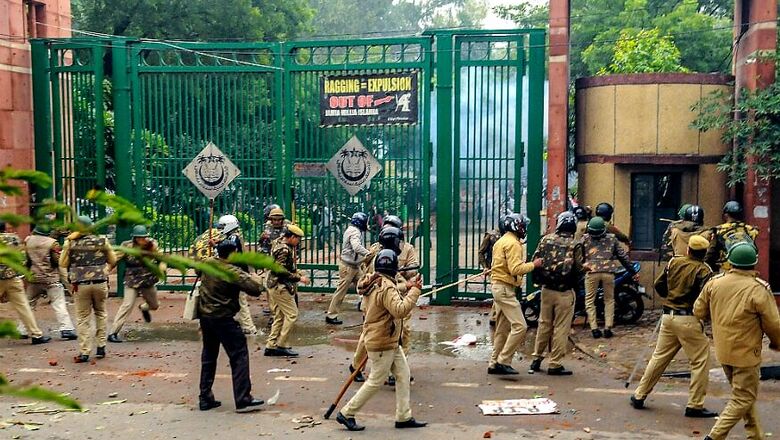
views
The police on Wednesday opposed in the Delhi High Court setting up of an SIT or a Commission of Inquiry (CoI) to look into the violence at Jamia Millia Islamia (JMI) university in December last year, saying it would "amount to supplanting the law".
The submission was made before a bench of Chief Justice D N Patel and Justice Prateek Jalan by Additional Solicitor General (ASG) Aman Lekhi, representing Delhi Police, during the hearing of several petitions which have alleged that ruthless and excessive use of force and aggression was unleashed by the police and paramilitary forces on students at the university.
The incidents of violence in the varsity had occurred in relation to student protests against the Citizenship (Amendment) Act (CAA).
Lekhi commenced arguments after the counsels for various petitioners finished theirs.
On Tuesday, arguments on behalf of the petitioners - lawyers, JMI students, residents of Okhla in south Delhi, where university is located, and the Imam of Jama Masjid mosque opposite Parliament House - had gone on for more than five hours and the remaining were adjourned to Wednesday.
The batch of PILs have sought setting up a Special Investigation Team, a CoI or a fact finding committee as also medical treatment, compensation and interim protection from arrest for the students and registration of FIRs against the erring police officers.
After the petitioners' lawyers completed their submissions on Wednesday, Lekhi urged the court to permit him to argue on another date as he was already attending several other hearings in other matters.
The bench insisted however that he at least start his arguments.
Lekhi commenced by stating that the petitions were not maintainable and the reliefs sought cannot be granted as charge sheets have been filed in connection with the violence and they should have sought whatever relief they wanted before the subordinate court.
He further said that setting up a fact finding committee or a SIT would amount to supplanting the law as it exists now.
On the issue of police entering the varsity without permission, the ASG said that internationally police are not denied access to educational institutions and universities.
With regard to providing compensation to students who were seriously injured in the violence, he said that it can be awarded only if there was an admission of breach and in the present case the issue was still being examined.
He said the case of the petitioners was based on an "assumption of wrongdoing" by the police and it involves disputed questions of fact for which the evidence on record has to be examined.
He concluded his arguments for the day by saying that the petitions were "grossly misconceived" and ought to be dismissed.
The bench listed the matter for further arguments on August 14.
On Tuesday, August 4, during the over five hour long hearing, the petitioners had said that there was need for an SIT which was independent of the police and the central government who by their conduct have shown that their investigation into the violence was "not independent".
They had also argued for a fact finding committee saying the same was suggested by the Supreme Court and setting up such a body would "be the best way to soothe or put balm on the wounds of the students".
They had said that such a move would also "reassure the public" and would restore the people's faith in the system.
They had also urged the bench to consider setting up a CoI to look into the incidents of violence as fundamental rights and human rights of the students were allegedly violated by the police force.
They had also contended that before entering the campus, the police ought to have sought permission of the varsity since the university is an autonomous body.















Comments
0 comment